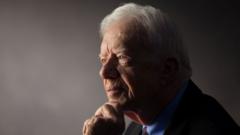**In an exclusive interview, Dr. Alessio Figalli elaborates on optimal transport, its historical context, and significance in both theoretical and practical realms.**
**Exploring Optimal Transport: A Conversation with Mathematician Alessio Figalli**

**Exploring Optimal Transport: A Conversation with Mathematician Alessio Figalli**
**A deep dive into the applications and importance of optimal transport through the insights of renowned mathematician Alessio Figalli.**
Alessio Figalli, a distinguished mathematician affiliated with ETH Zurich and the Institute for Advanced Study in Princeton, N.J., focuses his research on optimal transport, an intriguing area of mathematics that seeks to determine the most efficient paths of allocation—connecting starting points to end points. His work spans a diverse range of phenomena, including cloud movements, crystal formations, bubble dynamics, and the underlying algorithms of chatbots.
Awarded the prestigious Fields Medal in 2018, Dr. Figalli expresses a passion for mathematical problems rooted in tangible observations from the natural world. He remarked on the “sense of eternity” inherent in mathematics during a recent discussion, noting, “It is something that will endure indefinitely.” While acknowledging that nothing lasts forever, he insists that mathematical truths will persist for “long enough,” asserting that once a theorem is proven, it stands unchallenged, yielding reliability for future generations.
The concept of optimal transport, which has roots dating back nearly 250 years to Gaspard Monge—a French mathematician and politician—was initially conceived as a solution to military logistical challenges. Monge sought to discover more efficient strategies for transporting materials, particularly through the lens of fortification construction during the Napoleonic Wars.
In 1975, Russian mathematician Leonid Kantorovich further advanced this field, earning a Nobel Prize in Economic Sciences for developing a comprehensive mathematical framework for optimal resource allocation. Dr. Figalli referenced an illustrative example that demonstrates the theory's application to the bakery and coffee shop markets, where the goal is for all bakeries to satisfy the daily demands of every coffee outlet with minimal waste.
“This situation represents a global wellness optimization problem,” Dr. Figalli explained. “There is no competitive stance among bakeries or coffee shops; rather, we work to optimize the overall utility for the entire community. This task is inherently complex, as variations by a single bakery or coffee shop are bound to affect the entire system.”
The following interview excerpts from Dr. Figalli, conducted during a recent New York City event organized by the Simons Laufer Mathematical Sciences Institute, illustrate his profound insights into the realm of optimal transport and its implications for various industries and scientific inquiries. The captivating dialogue has been abridged and refined for clarity and readability.















